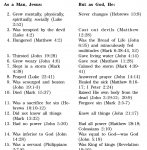From the Bible we see that Jesus Christ had two distinct natures in a way that no other human being has ever had. One nature is human or fleshly; the other nature is divine or Spirit. Jesus was both fully man and fully God. The name Jesus refers to the eternal Spirit of God (the Father) dwelling in the flesh. We can use the name Jesus when describing either aspect or both. For example, when we say Jesus died on the cross, we mean His flesh died on the cross. When we say Jesus lives in our hearts, we mean His Spirit is there.
Below is a comparative list that will illustrate what we mean when we say Jesus had two natures or a dual nature.

We can resolve most questions about the Godhead if we properly understand the dual nature of Jesus. When we read a statement in Scripture about Jesus we should determine whether it describes His deity, His humanity, or both. Moreover, whenever Jesus speaks in Scripture we must determine whether He is speaking from His position as a human, as God, or both. We should not think of two persons in the Godhead or of two Gods, but we should think of the divine Spirit and authentic human flesh.
In every way that we humans can speak of our humanity and our relationship to God, so could Jesus, except for sin. Yet He could also speak and act as God. For example, He could sleep one minute and calm the storm the next minute. He could speak as a human and then as God, while being both simultaneously.
We must always remember that Jesus is fully God and not merely an anointed man. At the same time, He was fully human, not having just an appearance of humanity. He had a dual nature unlike anything we have, and we cannot adequately compare our existence or experience to His. What would seem strange or impossible if applied to a mere human becomes understandable when viewed in the context of One who is both fully God and fully human at the same time.
Below is a comparative list that will illustrate what we mean when we say Jesus had two natures or a dual nature.

We can resolve most questions about the Godhead if we properly understand the dual nature of Jesus. When we read a statement in Scripture about Jesus we should determine whether it describes His deity, His humanity, or both. Moreover, whenever Jesus speaks in Scripture we must determine whether He is speaking from His position as a human, as God, or both. We should not think of two persons in the Godhead or of two Gods, but we should think of the divine Spirit and authentic human flesh.
In every way that we humans can speak of our humanity and our relationship to God, so could Jesus, except for sin. Yet He could also speak and act as God. For example, He could sleep one minute and calm the storm the next minute. He could speak as a human and then as God, while being both simultaneously.
We must always remember that Jesus is fully God and not merely an anointed man. At the same time, He was fully human, not having just an appearance of humanity. He had a dual nature unlike anything we have, and we cannot adequately compare our existence or experience to His. What would seem strange or impossible if applied to a mere human becomes understandable when viewed in the context of One who is both fully God and fully human at the same time.
-
2
- Show all
